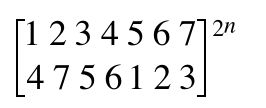关于置换群的题目下面列举几个:
POJ 2369 Permutations
题目还是比较简单的,就是一次求出每个循环节的长度,取它们的公倍数即可
//
// main.cpp
// poj 2369 Permutations
//
// Created by ccccsober on 7/2/16.
// Copyright © 2016 cccsober. All rights reserved.
//
#include
#include
#include
#include
#include
#include
#include
#include
#include
#include
#include
POJ 1026 Cipher
题目总体还是比较简单,算出每个置换群的阶,依次算出每个 k%loopsize[i] 就能得到结果了,下面相对详细的讲解下:
题目中:
{1 2 3 4 5 6 7 8 9 10}
↓ ↓ ↓ ↓ ↓ ↓ ↓ ↓ ↓ ↓ ⇒{1,4,7},{2,5},{3},{6,8},{9,10}
{4 5 3 7 2 8 1 6 10 9} ⇒loopsize[10]={3,2,1,3,2,2,3,2,2,2}
求loopsize的时候可以选择递归,这个很好的。
一开始我一直纠结算法复杂度,后来想想,一开始球loopsize的时候其实就是每个元素遍历一遍,这个不可能减少,而且也不算太高 ,在O(n)总体的复杂度也差不多。
给出AC参考代码:就是个递归着loopsize,之后处理下,代码实际不到60行...
//
// main.cpp
// poj 1026 Cipher
//
// Created by ccccsober on 7/3/16.
// Copyright © 2016 cccsober. All rights reserved.
//
#include
#include
#include
#include
#include
#include
#include
#include
#include
#include
#include
POJ 1721 CARDS
题目跟我预想的并不一样...
我开始觉得进行n次的置换那么的到应该等价下面分析:
n=1 有
那么如果是n次置换:
我觉得既然n是1~1000,那么这里应该会用到 快速幂取模,之后的到的数学式子等价于=
自己在笔算的时候可以得到这样的结果:
但说实话,直接怎样我实在是不知道如何进行了...
下面给出一个思路是别人的:
poj 1721
怎么说,我一开始很疑惑,为什么经过多番置换一定可以回到原来的数组...
比如下面这个例子:
1 2 3 4 5 6 7 8 9
6 3 5 9 7 2 1 8 4 后来会发现是下面的情况:
1 2 3 4 5 6 7 8 9 1 2 3 4 5 7 8 9 1 2 3 4 5 6 7 8 9
6 3 5 9 7 2 1 8 4 ⇒ 2 5 7 4 1 6 8 9 ⇒ 5 1 6 4 2 7 3 8 9
我测试过后面总是在后面那两个中不断循环,这个置换那个循环节就是2吗?我要怎么从第一个得出他的循环节就是2?
但仔细研究了下题目叙述的到结果是:
这句话保证最后一定可以回到原始的状态...
**
Alice and Bob play a game. Alice first writes down all the numbers from 1 to N in some random order: a1, a2, ..., aN. Then she arranges the cards so that the position ai holds the card numbered ai+1, for every 1 <= i <= N-1, while the position aN holds the card numbered a1. **
...
最后还是给出一个参考的代码:
我考虑很久要不要把多余内容删掉,后来想想,留出自己的思考过程何尝不是好的足迹
//
// main.cpp
// poj 1721 CARDS
//
// Created by ccccsober on 7/6/16.
// Copyright © 2016 cccsober. All rights reserved.
//
#include
#include
#include
#include
#include
#include
#include
#include
#include
#include
#include
POJ 3821 Leonardo's Notebook
这个题目也不错,非常好的利用了循环群分裂的一些性质。
比较好的论文:置换群快速幂运算+研究与探讨
里面只看前半部分就绰绰有余了。
因为gcd(2*k,2)=2说明凡是置换p*p得到的结果,其实都是由p分裂过来的。长度为奇数的置换,不用在意,因为gcd(2*k+1,2)=1,长度为2*k 的循环,这个就是关注点了。任何一个 2*k 必然是 4*k分裂出现。并且又一个和它对应。那么,长度为偶数的一定是成对出现


